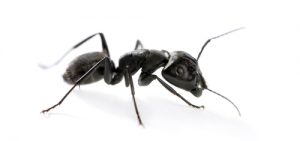Pavement Ant Nests are Usually Outside
By Chris Williams on June 6, 2011.
Q. I found some small dark ants in our house and took them to the University for identification. The entomologist said they were pavement ants. What do they do? Are they nesting in our house and will they damage the wood?
A. Unlike carpenter ants, pavement ants do not nest in or damage wood. They don’t cause any structural damage inside; they’re just a nuisance. Pavement ants get their name because their nests are usually found outside underneath or along the edge of sidewalks, driveways, and other hard surfaces. They excavate dirt and debris from the nest, piling it in small mounds through cracks in the slab above.
The question of whether they are nesting inside is harder to answer. But, in most cases, when pavement ants are found indoors, they are usually just foraging inside looking for food and are actually nesting outside under slabs, stones, bricks, patio blocks, boards, sidewalks, driveways, and in mulch. Most homes with pavement ant problems inside are built on concrete slabs or have basement walls made of cement block.
Pavement ants get into buildings through cracks in the slab, expansion joints, weep holes, around waste pipes and bath traps, through subslab heating ducts, and any other tiny openings. The ant workers will follow trails for as far as 30 feet to reach food sources. Like other ants, pavement ants feed on a variety of foods, but prefer foods with a high fat or grease content. Indoors, they like cheese, meats, insects, nuts, and pet food.
 Here are some clues that the ants may be nesting inside your home: (1) you see swarming (winged) ants inside your home, (2) worker ants are seen inside consistently over several weeks time, or (3) piles of ant “dump” (made up of bits of soil, debris, dead insects, grains of concrete or mortar) pushed out of nest sites are seen inside.
Here are some clues that the ants may be nesting inside your home: (1) you see swarming (winged) ants inside your home, (2) worker ants are seen inside consistently over several weeks time, or (3) piles of ant “dump” (made up of bits of soil, debris, dead insects, grains of concrete or mortar) pushed out of nest sites are seen inside.
Indoors, pavement ants nests are often found near ground level masonry walls. The ants will follow pipes, conduits, or electrical lines coming through slabs to reach higher levels. They can be found trailing along baseboards or the edges of carpeting. They often nest near sources of heat. Pavement ants will also nest in wall or ceiling voids, in wall insulation, under the slab beneath bath tubs or toilets, in cellars and under floors.
Whether the ants are actually nesting in your home or just entering your home looking for food, their presence is disturbing. Give Colonial a call. We can inspect to find the location of the nest or nests, whether inside or outdoors, and can set up a control program that will keep those ants out of your house.